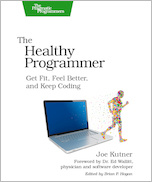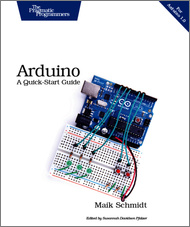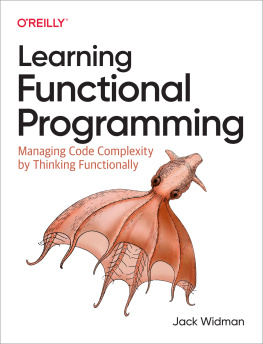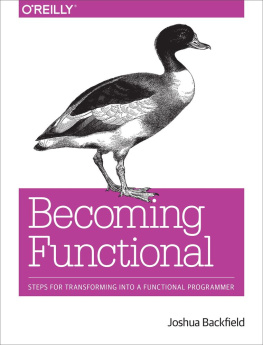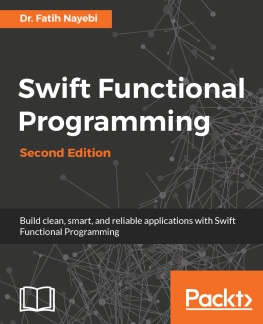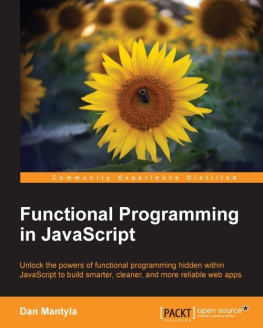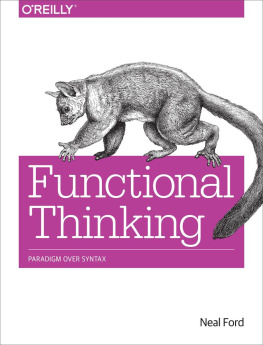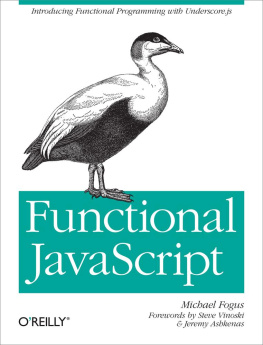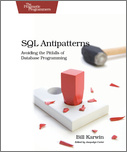Functional Programming: A PragPub Anthology
Exploring Clojure, Elixir, Haskell, Scala, and Swift
by Michael Swaine, and the PragPub writers
Version: P1.0 (July 2017)
Copyright 2017 The Pragmatic Programmers, LLC. This book is licensed to the individual who purchased it. We don't copy-protect it because that would limit your ability to use it for your own purposes. Please don't break this trustyou can use this across all of your devices but please do not share this copy with other members of your team, with friends, or via file sharing services. Thanks.
Many of the designations used by manufacturers and sellers to distinguish their products are claimed as trademarks. Where those designations appear in this book, and The Pragmatic Programmers, LLC was aware of a trademark claim, the designations have been printed in initial capital letters or in all capitals. The Pragmatic Starter Kit, The Pragmatic Programmer, Pragmatic Programming, Pragmatic Bookshelf and the linking g device are trademarks of The Pragmatic Programmers, LLC.
Every precaution was taken in the preparation of this book. However, the publisher assumes no responsibility for errors or omissions, or for damages that may result from the use of information (including program listings) contained herein.
About the Pragmatic Bookshelf
The Pragmatic Bookshelf is an agile publishing company. Were here because we want to improve the lives of developers. We do this by creating timely, practical titles, written by programmers for programmers.
Our Pragmatic courses, workshops, and other products can help you and your team create better software and have more fun. For more information, as well as the latest Pragmatic titles, please visit us at http://pragprog.com.
Our ebooks do not contain any Digital Restrictions Management, and have always been DRM-free. We pioneered the beta book concept, where you can purchase and read a book while its still being written, and provide feedback to the author to help make a better book for everyone. Free resources for all purchasers include source code downloads (if applicable), errata and discussion forums, all available on the book's home page at pragprog.com. Were here to make your life easier.
New Book Announcements
Want to keep up on our latest titles and announcements, and occasional special offers? Just create an account on pragprog.com (an email address and a password is all it takes) and select the checkbox to receive newsletters. You can also follow us on twitter as @pragprog.
About Ebook Formats
If you buy directly from pragprog.com, you get ebooks in all available formats for one price. You can synch your ebooks amongst all your devices (including iPhone/iPad, Android, laptops, etc.) via Dropbox. You get free updates for the life of the edition. And, of course, you can always come back and re-download your books when needed. Ebooks bought from the Amazon Kindle store are subject to Amazon's polices. Limitations in Amazon's file format may cause ebooks to display differently on different devices. For more information, please see our FAQ at pragprog.com/frequently-asked-questions/ebooks. To learn more about this book and access the free resources, go to https://pragprog.com/book/ppanth, the book's homepage.
Thanks for your continued support,
Andy Hunt
The Pragmatic Programmers
The team that produced this book includes: Andy Hunt (Publisher) Janet Furlow (VP of Operations) Susannah Davidson Pfalzer (Executive Editor) Potomac Indexing, LLC (Indexing) Nicole Abramowitz (Copy Editor) Gilson Graphics (Layout)
For customer support, please contact .
For international rights, please contact .
Table of Contents
Copyright 2017, The Pragmatic Bookshelf.
Early Praise for Functional Programming: A PragPub Anthology
If youve been wondering what all the functional hubbub is about, Functional Programming: A PragPub Anthology will satisfy. You can wet your whistle with several languages, get a feel for how to think functionally, and do so without overcommitting to one language or school of thought.
| Ben Vandgrift |
| Chief architect, Oryx Systems Inc. |
Programmings last sea change was in the 1990s when object orientation went mainstream. Its happening again, but this time its functional programming thats sweeping through our profession. Read this book to understand why and to learn how to ride the wave.
| Paul Butcher |
| Founder and CTO, writeandimprove.com |
I really enjoyed the structure and flow of the book. The chapters stand on their own as essays but when put together make a strong argument for functional programming, regardless of the language. Its also a treat to see all these different familiar writers write about diverse languages.
| Ben Marx |
| Lead engineer, Bleacher Report |
Youre sure to find a way functional programming resonates with you with the wealth of approaches and languages covered. The treatment of Scala collection is superb: everything a beginner needs to know from the get-go!
| Jeff Heon |
| Research software developer, CRIM |
Introduction
by Michael Swaine
This book shows how five different languages approach the paradigm of functional programming. The chapters were written by experts in the different languages and first appeared as articles in PragPub magazine. After publishing nearly one hundred issues of the magazine, it became clear that we were in possession of a wealth of information about functional programming, and we decided that some of the best articles would make an interesting book.
Functional programming is one of the major paradigms of programming. In functional programming, we approach computation as the evaluation of mathematical functions, and as much as possible we avoid changing state and mutable data.
Certain concepts and issues are sure to come up in any discussion of functional programming. Recursion. Lazy evaluation. Referential transparency. Eliminating side effects. Functions as first-class objects. Higher-level functions. Currying. Immutable data. Type systems. Pattern matching. The authors touch on all these concepts, looking at them from the perspective of different languages.
But functional programming is not an all-or-none thing. It is perfectly reasonable to write imperative code that uses functional techniques and practices and data structures. It is fine to mix and match styles, and some programming languages are designed as hybrids, allowing you to use the style that best fits your needs of the moment. Scala, for example, or Mathematica, or Swift. Our authors explore these different approaches in this book, and you can decide which works best for you.
We explore functional programming in five languages in this book, with articles by experts in each language. If this encourages you to look for a definitive guide to some of the languages, we can recommend Venkat Subramaniams . What youll find here is an exploration of an important programming paradigm in five languages, written by a team of experts. Thats what we set out to create.
I hope you will agree that the result is an interesting book.
Copyright 2017, The Pragmatic Bookshelf.
Acknowledgements
Not for the first time, the editor is pleased to acknowledge his colleagues at the Pragmatic Programmers, who are a joy to work with, thorough professionals, and wonderful human beings. This book especially benefitted from the skills and judgement of publisher Andy Hunt who understood the vision, vice president of operations Janet Furlow who steered it to completion, executive editor Susannah Davidson Pfalzer who helped shape it, and copy editor Nicole Abramowitz who fixed its flaws.

